# 32 Journey to the Galápagos (IV): Living off the Grid on a Cacao Plantation
On sounds of silence, unreadable stars, and slow life with geckos
This month, Daniel and I are renting a small house in the highlands of Santa Cruz, one of the four inhabited islands of The Galápagos. A biologist working at the Charles Darwin Research Station built it together with her husband, a diver-scientist, in preparation for their near retirement.
The wooden two-story home is beautiful, with sweeping views of the distant ocean. It’s set on an organic cacao plantation where it takes me ten minutes on a meandering gravel path to walk around the land. The place is wonderfully isolated: The nearest neighbor lives half a kilometer (0,3 miles) away.
But what drove us up here was another quality: The house is entirely self-sustainable.
What does that mean? And what’s it like to live off the grid in the middle of nowhere?
This is Journey to the Galápagos episode IV. For previous episodes please read Quito and First Impressions (I), Exploring San Cristóbal (II), Hiking and Snorkeling (III), and How We Prepared for our Journey to the Galápagos.
Sounds of Silence
Imagine the whoosh of island wind in trees, the chatter of birds, the intermittent screeching of insects, the tap-tap of light rain, the croaking of frogs, the gush of a downpour, and the occasional barking of remote dogs.
The wild roosters are by far the loudest creatures on our land. They crow not only at dawn but all through the night and whenever a shouting match starts or they’re in the mood. Twice a day, at most, a pickup drives by, its motor like an alien hum. On weekends, if I strain my ears, I can hear children play.
The silence, or relative silence, is a balm to us. It’s why we love Japan and can stay in Hoi An (Vietnam) only for limited amounts of time.
One evening at sunset, five donkeys clip-clop onto our property. Not knowing how to escort them out or contact their owner, we dine with a soundtrack of snorts, sighs, and brays as they feast on the grass that was ready for cutting anyway.
On quiet nights, we listen to the ocean breaking its wholeness on the black lava rocks.
Water
We live on rain water. The house collects the rain in gutters from where it trickles (or gushes) into two 15,000 liter (4,000 gallon) tanks underground. Mesh filters remove the debris and a pump pushes the water up in a tower from where it flows with gravity back to the house. Our water pressure is low yet sufficient. We shower, do our dishes, wash our hands, and flush the toilet with rain.
The water we drink is pumped from the tanks into a three-filter system that removes impurities so well that even healthy minerals such as calcium and magnesium are taken out. UV radiation then kills any bacterial life that might be left before the water is sent to our special tap.
Our purified rain water tastes far better than the desalinated water most people on the island consume. Fresh (lake) water is a rare commodity on the Galápagos.
Food
What we eat from our land: cacao, bananas, papayas, lime-sized & lemon-sour oranges, avocados, squash, chayotes, and an herb medley of mint, basil, rosemary, oregano, and melissa (lemon balm).
What we consume from the land of our neighbors: coffee, eggs, watermelons, tomatoes, chard, spongy cow cheese, green bell peppers, red onions, and red cabbages.
What we import from the town (or mainland Ecuador): quinoa, lentils, black beans, corn, sweet potatoes, tuna, swordfish, ginger, seeds, nuts, and gin.
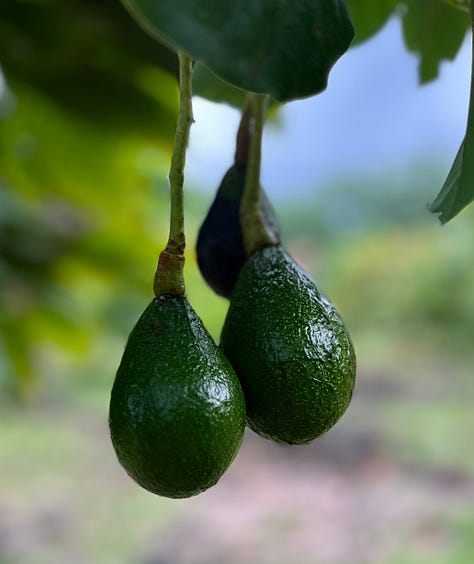

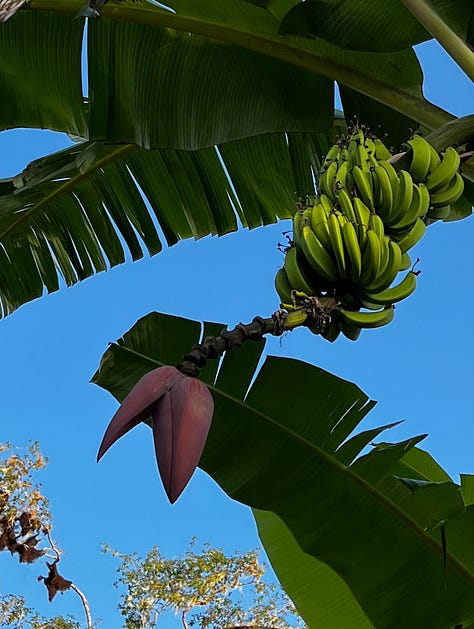
Fresh Cacao
“Do you want to eat fresh cacao?” Franklin asks.
We do.
Franklin is a cocoa farmer and the general caretaker of our grounds. He selects a cacao pod from a tree, shakes it gently until he hears it rattle, judges its deep brown color, deems the pod to be ripe, and plucks it from the branch. He slashes the pod open in his hand with three careful strikes of his machete. Look at that, a grin with fluffy teeth!
Cacao seeds grow in semi-transparent clusters on a fleshy white spine. For the production of chocolate, the dark brown cacao nibs would be removed from the fruit, but Franklin encourages us to eat the whole cluster. So we do.
It tastes exquisite. The white fruit is like lychees mixed with lavender and rose, more flowery than sweet. The longer I chew the fruit, the more the bitterness of the raw cacao nibs comes forth, creating a layered flavor I never experienced before. Mexican mole sauces may come close, but this tastes better.
Energy
All our energy comes from sun panels on the roof. We have enough to power our lamps, a large fridge, a washing machine, a standing fan, a blender, and a blue-tooth speaker—we’re not deprived of modern luxuries. Even after consecutive cloudy days, we don’t run out of energy. We do pay attention to our source, and typically charge our computers and phones during the day when the sun is out. We also don’t run the laundry when it rains and boil water on the stove in the evenings. Electrical boilers, we learn, consume energy like gluttons.
Knowing that we can run out of energy if we’re wasteful makes me aware of how much I usually rely on energy being readily available to me at all times. Simultaneously, I don’t feel guilt for running the fan all through the night. We only use the energy we harvest each day, so it’s clean and eco-friendly.
Co-Existing with Animals
On our first night in the house, when we’re outside watching the sunset from our hammocks and let the darkness fall around us like a screen, an owl lands on the terrace about an arm-length away. I’m so startled that an “oooh” escapes from my lips. The owl turns its head toward me and stares for what feels like a very long time. Then it flies away.
I have breakfast with Darwin’s finches, lunch with mocking birds, and dinner with frogs the size of my thumbnail. Black bumble bees bump against the screens as I write. The flycatchers hopping onto my yoga mat have bed-hair, as though preening themselves is too much trouble.
I cannot name all the wildlife I see, but does that mean I see less?
There are, unfortunately, no giant tortoises on our land. If I want to meet them, I must go down the road toward the coast for about thirty minutes.
Most abundant are the moths, fluttering around our lights, and their enemies, the geckos, whose droppings we find everywhere in the house, even in our bed. But they’re old friends, their soft noises like a lullaby.
The only creatures I refuse to co-exist with are cockroaches. Cockroaches I will kill.
Wood
The lower terrace, shaded from the morning sun (already strong at 8 am), is my yoga deck. Upside down, with my hands pressed against the wood, I feel part of the land from where the wood was taken.
My desk, too, is made of wood. My lower arms rest on smooth varnished boards with each word I write.
We eat on wood, sleep in wood, move between levels on wood, and absorb the creaking of the wooden floors as echoes of ourselves.
At a distance from the house, invisible from my desk, stands a huge ficus tree that may or may not be a hundred years old. According to the biologist from whom we rent the house, Franklin likes to tell tall tales.
Near Darkness
Our house on a hilltop in the highlands is about 10 km (6,2 miles) away as the crow flies from Puerto Ayora, the main harbor town of Santa Cruz. At night, the town lights up with a mysterious halo. Everywhere else, it’s pitch dark. Except for when the moon is out.
On a cloudless night before moonrise, we turn off all the lights and lay on our backs to stare at the sky. The stars reach nearly to the horizon. The smear of Milky Way, ghostly white, shines with an illumination all its own. Can that red star be Mars? Why can’t we locate the Great Dipper? I never learned much about astronomy and long to know more. What am I looking at?
Slow Life
“Are you bored?” he asks.
“I’m not bored,” I say. “How can I be bored? Are you?”
“No,” he says. “I thought I would be, but I’m not.”
We attend to our herb garden, check on the banana trees, unsuccessfully try to photograph the ever-moving finches, brew ginger tea or mint tea or hibiscus tea, sweep the floors and terraces, pluck ripe fruits (with Franklin’s help), hang our laundry in the sun, and do our Spanish lessons from the hammocks on the terrace.
We also do our taxes, edit our books and photos, discuss cover designs with our publisher, edit essays for other authors, send encouraging emails to clients, write essays such as this one, send invoices, research our next destination (Colombia), discuss the news, and stay in contact with family and friends. We even watch movies on Kanopy via the only fast wifi available at our location, which is, unfortunately, Starlink.
In short: we relax and work in a luxurious balance. How can we possibly be bored?
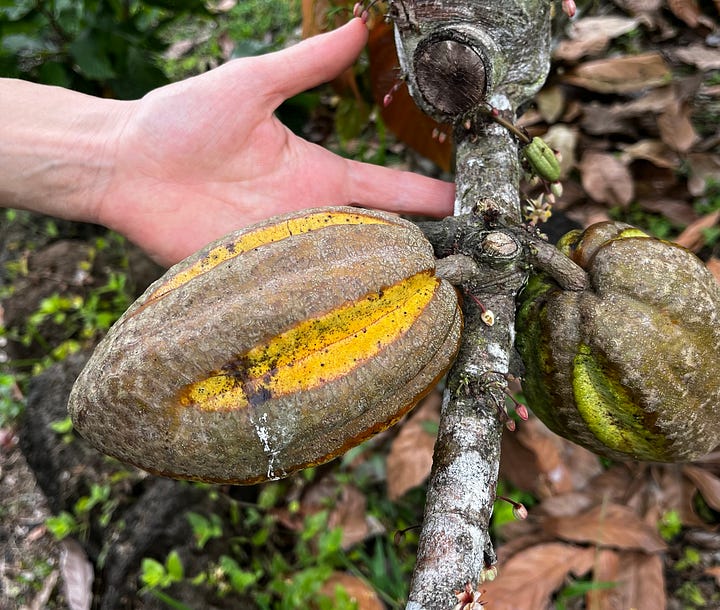
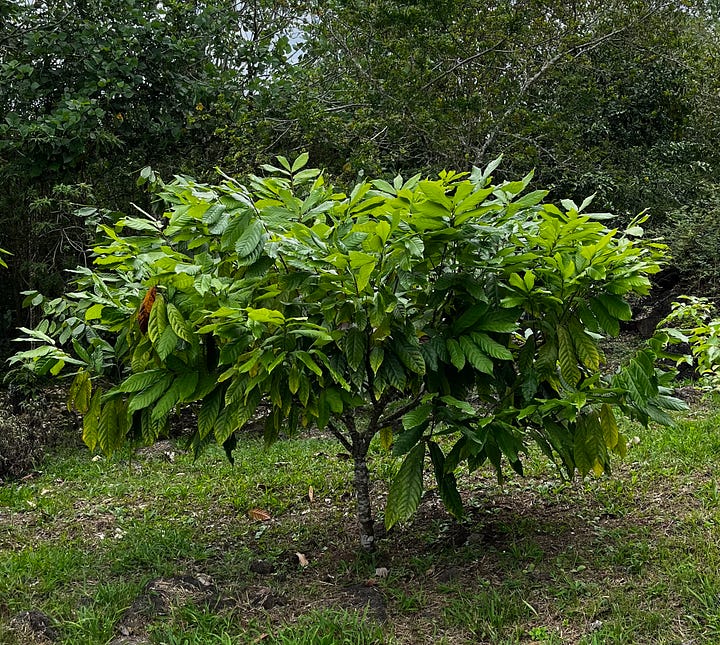
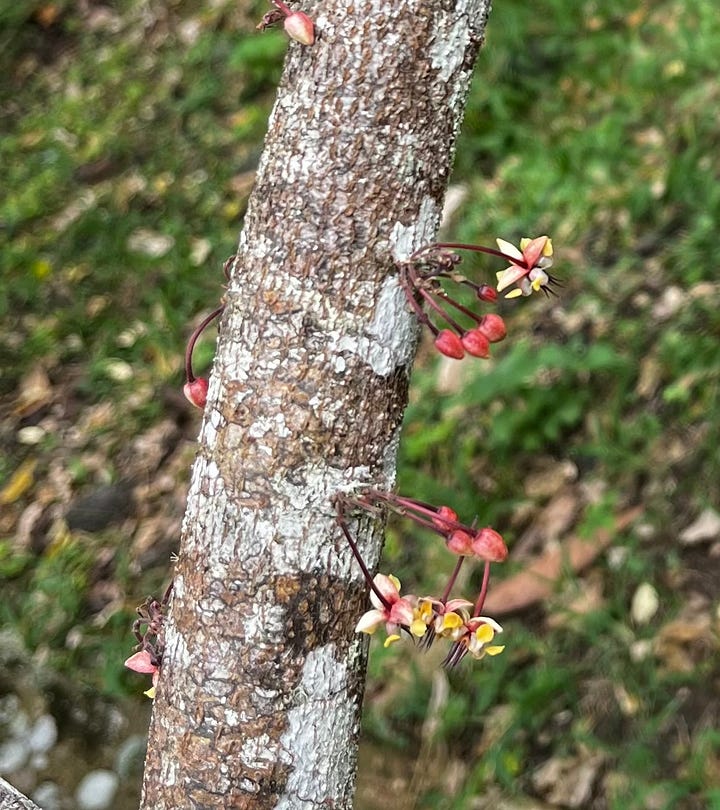
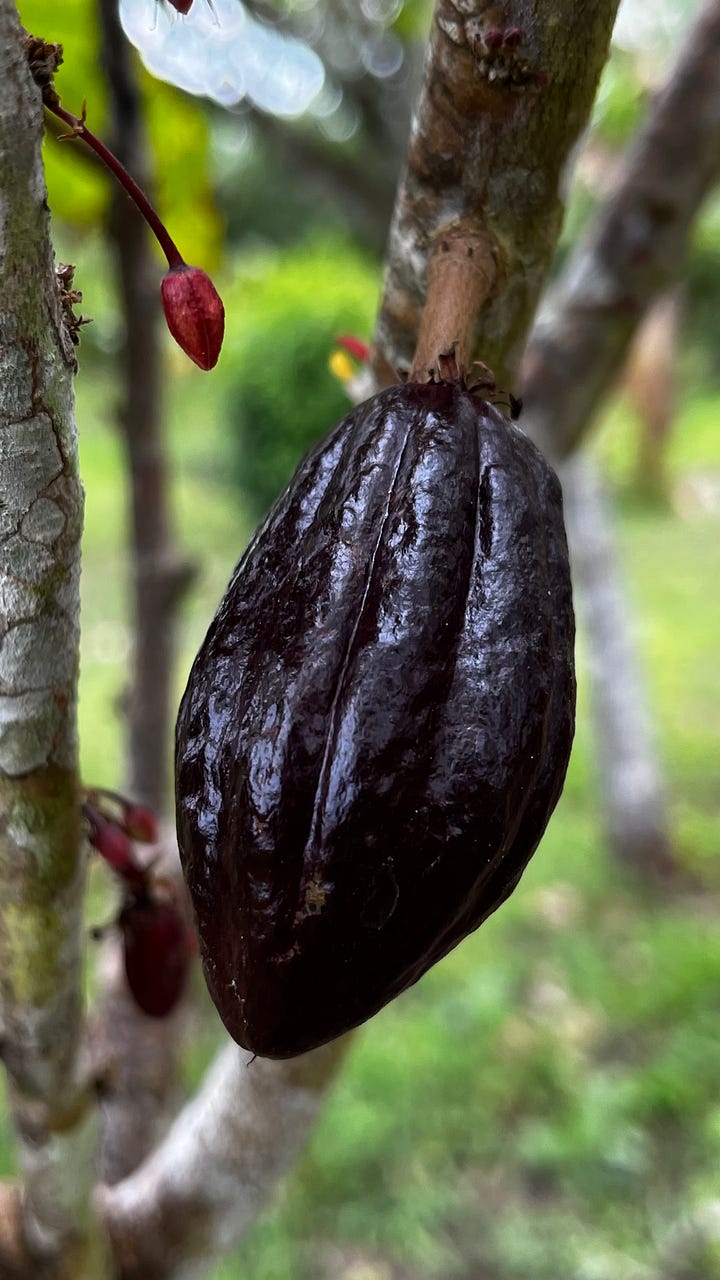
Heat?
We live nearly on the equator in the Southern hemisphere’s summer, so I expected heat and worried about not having air-conditioning, but the temperatures are mild here, especially at night. We use the fan more for its white noise (to battle the roosters) than for cooling our dreams. It’s best not to exert ourselves between 10am and 2pm and when we do, we’ll sweat profusely. But a vigorous walk in the late afternoon even when it’s sunny is not uncomfortable.
Waste
We have a compost bin on the counter that we empty every day on the compost heap at the edge of the land. We recycle glass, paper, and cans. Plastic food wrappings and toilet paper is the only trash we accumulate. As in many other places in the world, we don’t flush toilet paper here but throw it in a bin. This can stink, but with all the windows open and regular removal it’s not a big deal.
Our sewage goes into a biodigester (different from a septic tank), where the waste is broken down by bacteria in an oxygen-free (anaerobic) environment. In about three years, this will create an organic top soil that can be harvested and used as fertilizer for plants not meant for human consumption. The water on top flows into a secundary tank where a different set of bacteria will get to work. After this process, the water flows back onto the land. To keep all these helpful bacteria alive, the house came with biodegradable soap that we use for the dishes, our hands, and our hair. It’s not the best shampoo I’ve ever had, but who cares if I look like a flycatcher?
(This part about the sewage has been updated after I received more information from our host.)
Transportation
In our bid for independence, we rent mountain bikes to carry ourselves from the house to the coast and back. We don’t want to rely on taxis and prefer a cleaner means of transportation. But things don’t go as planned and… well, that’s a story for another time. It involves pin-like seeds, steep climbs, Portuguese man-of-war, and admirable/idiotic stubbornness. The result is: we’ve befriended some local drivers and take the infrequent bus into town.


Antidote to the Insanity of Our Times
Living off the grid in the middle of nowhere is an antidote to the insanity of our times. Each morning, I’m grateful to be here. It’s a privilege.
Is it also escapism?
The world of Gaza, Ukraine, Sudan, and Washington seems farther away here than it did when we lived in California or Italy. But staying informed and empathizing with those most affected is still part of our daily lives.
I skew more optimistic here. Being on the Galápagos shows it’s possible to live in a small community, in harmony with the environment and the animals with whom we share the Earth. Being here proves that tenderness and beauty coexist alongside brutality and suffering. In our small house on top of the hill, I am at home in this world.
This was Journey to the Galápagos episode IV. For previous episodes please read Quito and First Impressions (I), Exploring San Cristóbal (II), Hiking and Snorkeling (III), and How We Prepared for our Journey to the Galápagos.
Desk Journeys aka Reading Recommendations
While having breakfast with Darwin’s finches, I’m reading about their significance for our understanding of evolution, not in Charles Darwin’s The Origin of Species but in Stephen Moss’s wonderful Ten Birds That Changed the World.
The story that Darwin stepped onto the Galápagos and had an epiphany upon seeing multiple species of finches is a myth. The truth is that he didn’t understand what he was observing at first and did a lousy job in collecting and labeling specimens. It took Darwin many years and multiple collaborations with other scientists to arrive at the theory that changed how we perceive the world.
Ten Birds That Changed the World (Basic Books, 2024) is a beautiful book on how human history is intertwined with bird life, how carrier pigeons were essential in wars, how Dutch colonists caused the dodo to go extinct, and how ravens have inspired us for millennia—a great read.
Author News
I’ve been busy with other people’s words these past weeks, editing a personal essay for a Dutch author on her estranged relationship with her mother and beta-reading a very exciting nonfiction manuscript from a friend on bipolar disorder and the so-called lunatics in our history.
Do you have a writing project that needs a fresh pair of eyes? I’m available as an editor for short texts and book-length manuscripts. In case you have difficulty staying focused and finishing a project, I can help you as a coach, too. Please find more information on my services for writers on my website or send me a private message.
Related Posts
If you enjoyed this post, you might also be interested in reading:
Time to Say Goodbye
We have one week left in our house on the hill. In March, we’ll take the ferry to Isabela, where we hope to meet some penguins.
All my best,
Claire
P.S. Did you ever live off the grid? What was it like for you?





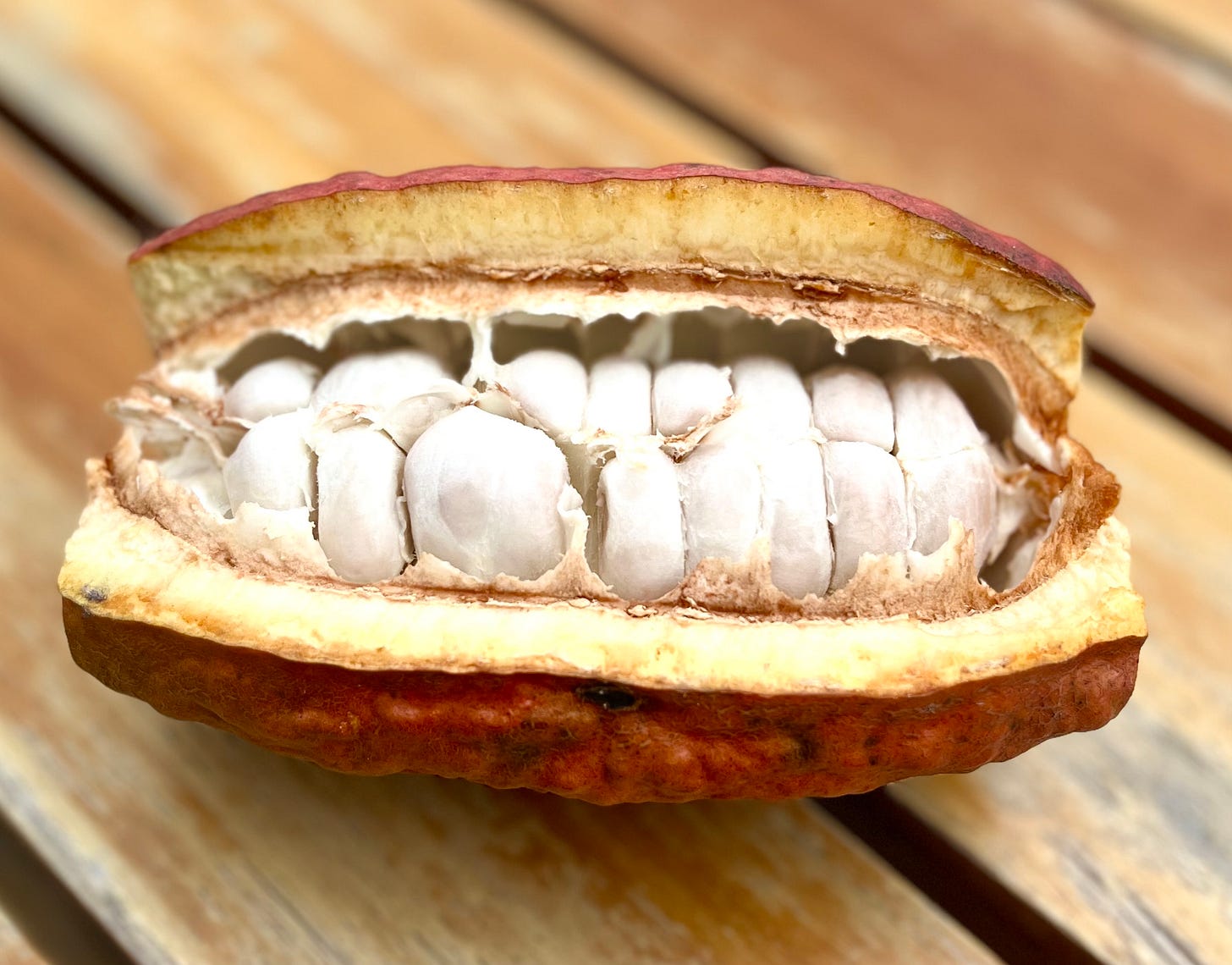


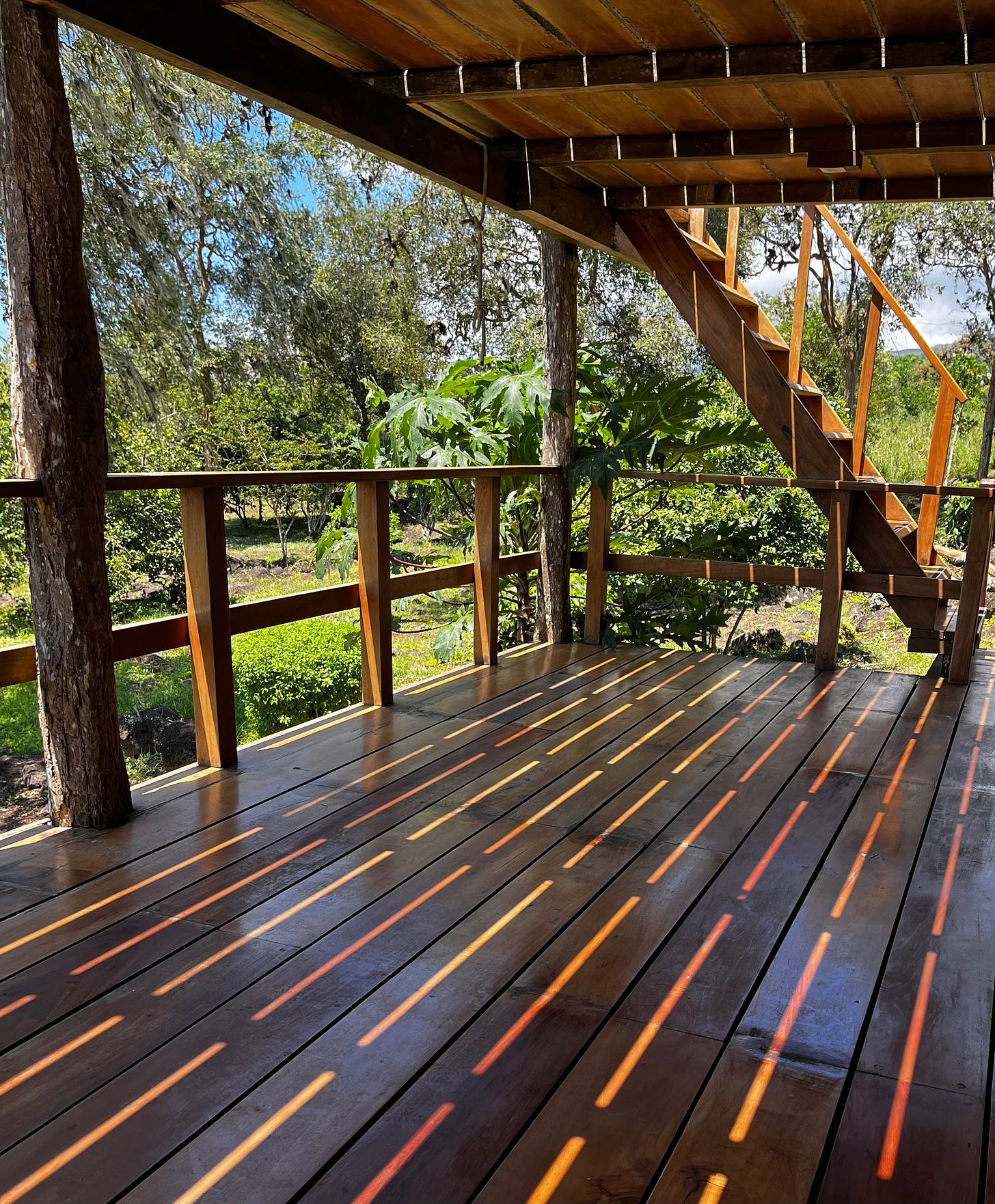


Your lives and that beautiful tortoise are inspiring. Have taken you much to heart. Thank you
This place sounds amazeballs!